Five Questions About IBS, Answered
Irritable bowel syndrome (IBS) is one of the most common gastrointestinal (GI) disorders worldwide, affecting ~10% of the population. IBS is a GI disorder that involves abdominal pain associated with changes to bowel patterns (constipation, diarrhea, or both). Other symptoms can involve bloating, excess wind or gas, and bowel urgency. IBS can be very hard to live with as the symptoms it causes can affect quality of life greatly.
As a registered dietitian working with a growing number of clients with IBS, these are common questions I receive:
1) Should I start the low FODMAP diet?
The low FODMAP diet is meant to help manage symptoms and there is high quality evidence to support this. However, this does not mean that everyone with IBS needs to trial a low FODMAP diet. Many symptoms can be resolved and managed without it. Working with a registered dietitian can help you determine if you would benefit from a low FODMAP diet.
2) What factors are affecting my IBS?
The physiology of IBS remains incompletely understood. However, it is thought to be multifactorial, meaning that many factors are playing a role. Here are some common factors that can lead to symptoms:
– Stress. The brain and the gut are connected very closely. Due to this, stress can often play a very big role in your symptoms. Focusing on self-care, seeing a mental health therapist, and discussing medication options with your doctor if necessary are some options to help manage your stress.
– Inadequate fibre intake. The gut requires adequate fibre to function optimally. Fibre keeps the content within the gut moving at a regular and reasonable pace. A lack in this area can exasperate irregular bowel patterns and overall gut motility.
– Food – I cannot stress enough the importance of having a balanced diet as your foundation. The gut functions best with consistent and balanced meals. If this balance is not there, many symptoms can arise. Of course some people also have individual food sensitivities or food triggers, but the importance of a balanced diet is extremely important to help understand what those food triggers might be.
3) What types of foods should I avoid to reduce my bloating?
Again, many factors play a role when trying to identify the cause of the bloating with IBS, but here are some food specific common trends:
– Going long periods of time without food + eating large portions. If you are going over four hours without food often, this may be exasperating your bloating. The motility of our gut functions optimally with having food every 2-4 hours. Small and frequent meals can be a strategy to avoid needing to eat large meals that may cause you to become overfull and more bloated.
– Balanced meals. Again, if your meals are not balanced, the gut is not able to digest foods optimally, which can result in symptoms such as bloating.
– Carbonated beverages or drinking through a straw. These are two situations that produce lots of air into our GI tract, which can exasperate bloating.
– Food triggers. Aside from the above listed examples, specific foods may cause you distress. See the last question in this blog to learn more about this area.
4) How can I manage my bowel movements?
– Adequate dietary fibre. Getting in ½ plate of vegetables with lunch and dinner, choosing fruits at snacks and with breakfast, opting for whole grains instead of white or refined grains most of the time are a few strategies to help improve dietary fibre. Some people may also benefit from a fibre supplement: flaxseed can help manage constipation and psyllium husk can help manage diarrhea or loose stools.
– Adequate fluid –Dehydration is a big factor in constipation. Having inadequate fluid is also necessary for optimal bodily functions, so prioritizing water intake is important for everyone, not just those with IBS.
– Physical activity – physical activity can help increase motility in the GI tract, which can help with constipation.
– Stress management – due to strong connection between our minds and GI tract, stress can impact both loose stools, and constipation or hard stools.
5) Is there a test I can take to understand my food sensitivities?
Unfortunately, there is no test that is backed by sound scientific evidence that can tell us about food sensitivities. Food allergies are a different situation, and if you think you may be allergic to a food please speak with your doctor.
However, keeping a food and GI symptom journal to help bring awareness to any connections between certain foods and symptoms can help with understanding as well as trying an elimination diet with the assistance of a registered dietitian.
By Katrina DuBois,
Registered Dietitian (Nutritionist)
References:
Moayyedi, P., Andrews, C. N., MacQueen, G., Korownyk, C., Marsiglio, M., Graff, L., . . . Vanner, S. (2019). Canadian association of gastroenterology clinical practice guideline for the management of irritable bowel syndrome (IBS). Journal of the Canadian Association of Gastroenterology, 2(1), 6-29. doi:10.1093/jcag/gwy071
Ng, Q. X., Soh, A. Y. S., Loke, W., Lim, D. Y., & Yeo, W. (2018). The role of inflammation in irritable bowel syndrome (IBS) Informa UK Limited. doi:10.2147/jir.s174982

